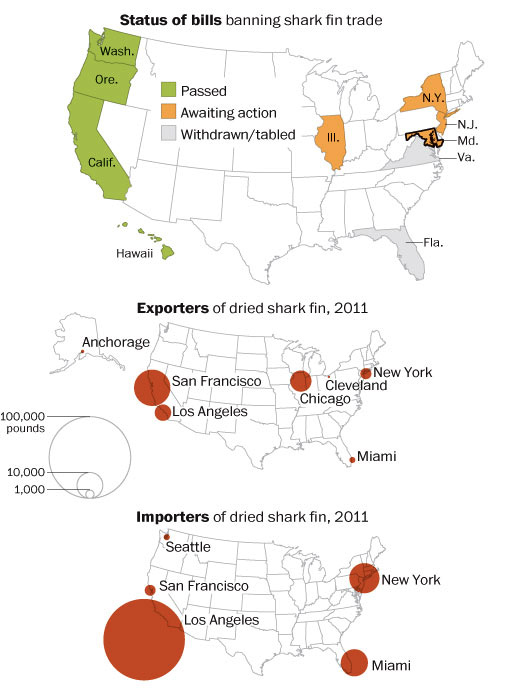Bans against shark finning and export have been passed by several states and seem to be slowly gaining traction. Since most shark fishing and export of shark fins happens outside of US waters, this type of legislation is relatively ineffective in reducing a global problem. But it is a start and I think may be helping to increase public awareness about global shark population declines. For example, the bans are fueling more coverage of the issue in newspapers, like this piece in today’s WaPost by shark lover Juliet Eilperin (whom I am having dinner with later this month and whom Helen interviewed recently for our Book Hook series). Ill excerpt the piece below:
Not a single shipment of shark fins moved through the Port of Baltimore last year, according to the National Oceanic and Atmospheric Administration. But Maryland still may ban the sale and trade of the Asian delicacy, much to the ire of some fishermen and restaurant owners.
Moves to restrict the shark fin trade — which is now illegal in four states and has prompted legislation in at least six others — has stirred a noisy public debate about how best to protect a top ocean predator whose numbers are shrinking. While the U.S. boasts some of the world’s toughest restrictions on shark fishing, requiring sharks be brought in with their fins attached, proponents of the measure argue more needs to be done to stem the decline of sharks.
“This is everyone’s problem,” said Maryland Del. Eric Luedtke (D-Montgomery County), who wrote the House bill partly out of his concern for the Chesapeake Bay. He noted that large sharks off the East Coast have declined by 90 percent compared with historic levels, which led to an explosion in the Bay’s cownose ray population, and that in turn wiped out some oyster beds. “The reality is sharks don’t recognize state boundaries; they don’t recognize international boundaries. What’s bad for oceans elsewhere is bad for oceans here.”
But some Asian American businesses that serve shark’s fin soup, as well as fishing operators who catch sharks legally, oppose the bans, which went into effect in Hawaii in 2010 and in California, Washington and Oregon last year after receiving wide bipartisan support.
A group representing Asian American shark fin dealers, restaurateurs and grocers will argue in the California Superior Court in San Francisco next monththat the ban is unconstitutional because the federal government has ultimate authority over interstate commerce and the state is not compensating them for the economic loss.
Read the full piece here in the WaPost

Leave a Reply